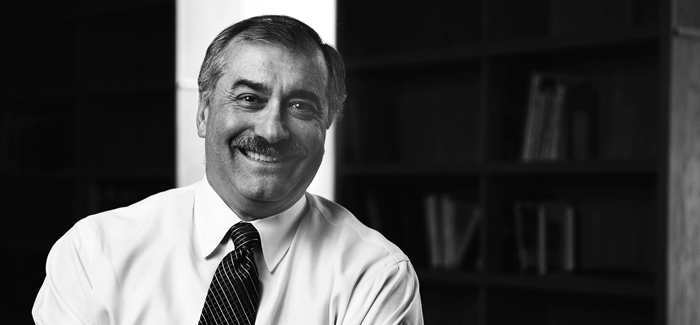
Dean Rocky Kolb (Photo courtesy the Physical Sciences Division)
A note from the dean of the Physical Sciences Division.
In December 1942 a group of physicists led by Enrico Fermi, operating in what was code-named the Metallurgical Laboratory, built the first nuclear reactor—Chicago Pile-1—underneath the old Stagg Field. There they achieved the first controlled, self-sustaining nuclear reaction, giving rise to the atomic age. (See “Manhattan’s Critical Moment.”)
Afterward, for safety reasons, the Met Lab moved out of Chicago to a spot near Palos Hills, Illinois, and was renamed Argonne after the surrounding forest. It was formally chartered as Argonne National Laboratory in 1946, signaling the beginning of “big science”—large-scale scientific research often supported by federal governments. Physics had entered the public domain.
Fermi’s experiment led to the formation of three institutes at UChicago: the Institute for Nuclear Studies, which became the Enrico Fermi Institute; the Institute for Metals, which evolved into the James Franck Institute; and the discontinued Institute of Radiobiology and Biophysics. The EFI, now famous for astrophysics and particle physics research, and the JFI, at the intersection of materials science, condensed matter physics, physical chemistry, and atomic, molecular, and optical physics, are cornerstones of the Division of the Physical Sciences.
From the first nuclear weapons to nuclear energy to radiation cancer therapy, the University has been on the forefront of atomic age breakthroughs. We’ve also been the first to warn of the destruction that came to pass, dangers with us now, and threats to our future born of nuclear research. UChicago scientists founded the Bulletin of the Atomic Scientists after the atomic bombs were detonated in Japan. It still operates today to acknowledge, address, and take responsibility for nuclear science and how it’s used.
The University is commemorating the 75th anniversary of CP-1 by considering our history and our role in shaping the world. Events have been held throughout the fall quarter and will culminate in a two-day symposium on December 1 and 2. Physicists, chemists, historians, public policy leaders, and the community will join in free inquiry and expression and will engage the world in understanding what happened here, where it led, and what’s to come. For information, see mag.uchicago.edu/cp1-events.
